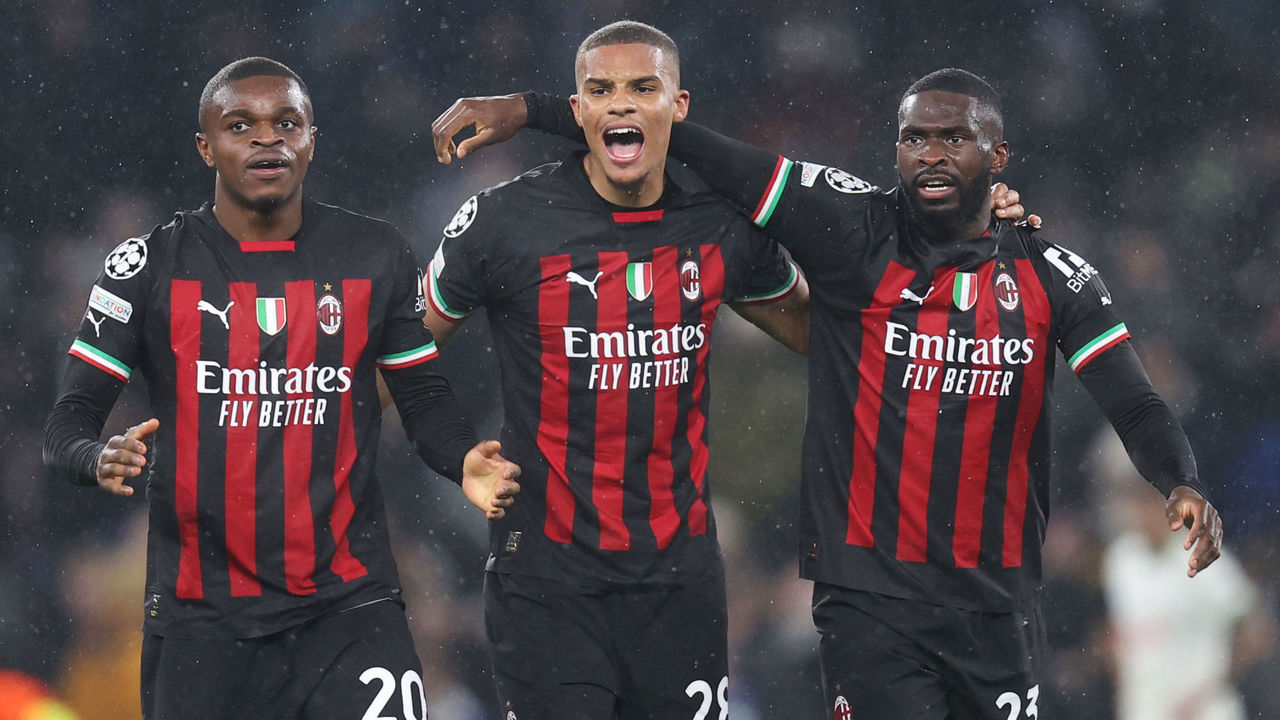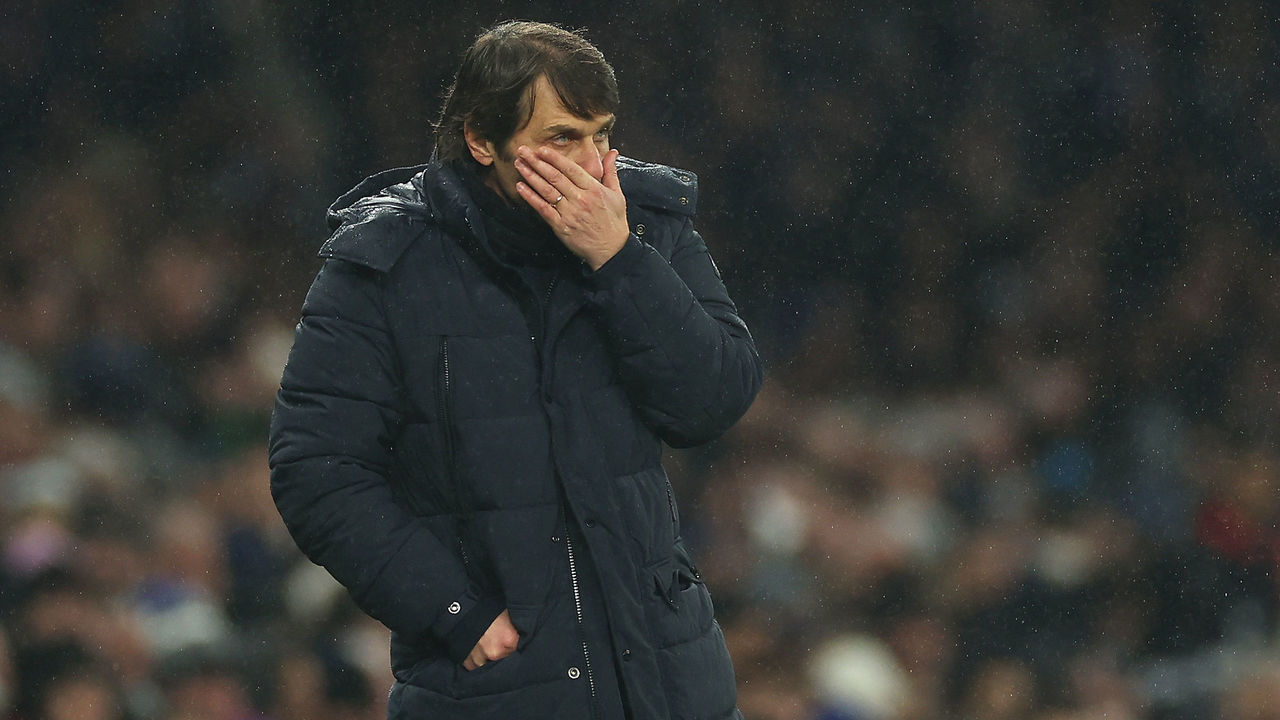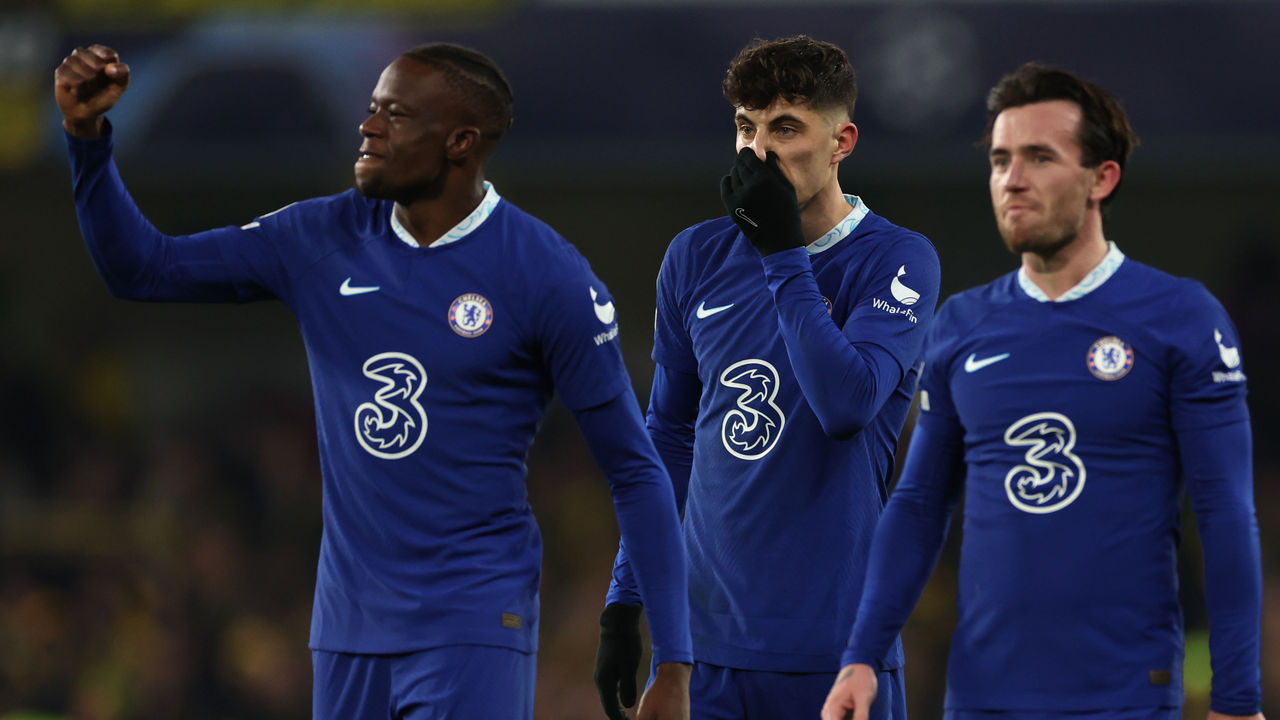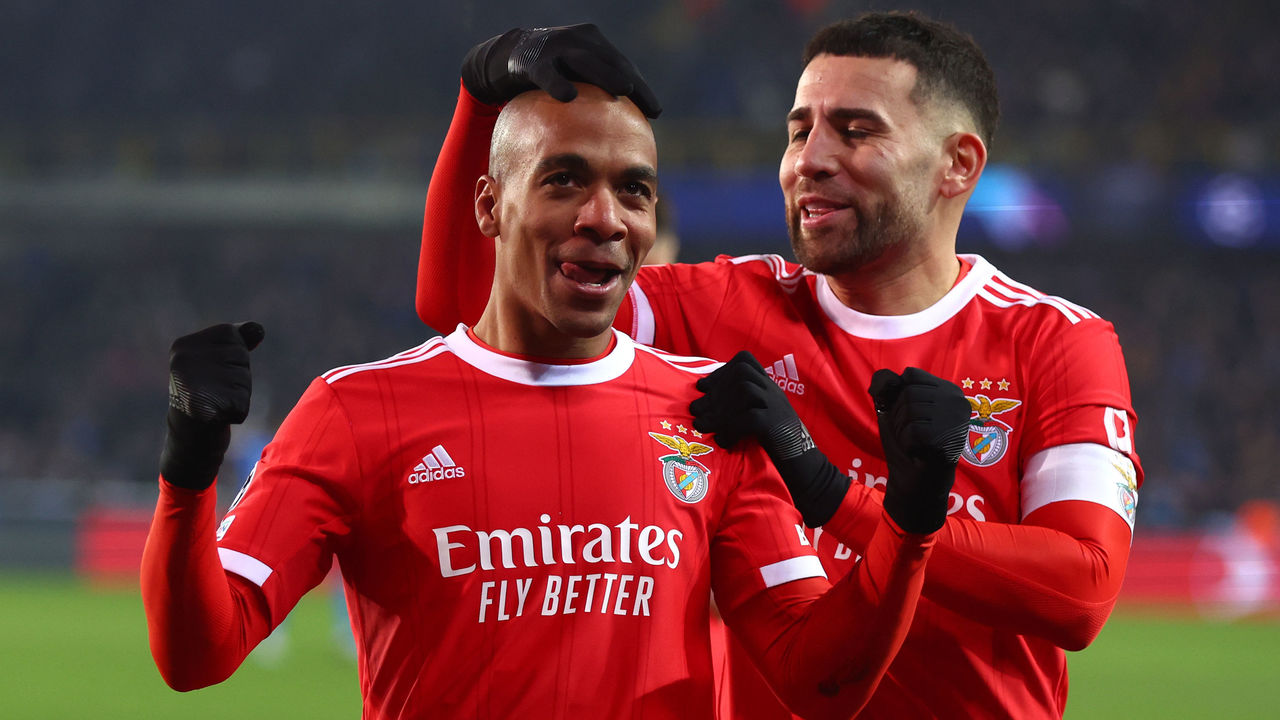Table of Contents
The Champions League last 16 rumbled on this week, as the first four quarterfinalists were decided. Below, we dissect the biggest talking points from this week’s action in Europe’s premier club competition.
Lifeless PSG fail on biggest stage again
“We have a game plan, and we have Kylian.”
Paris Saint-Germain manager Christophe Galtier was supremely confident that the mere presence of his star forward would make all the difference. In fairness, Mbappe‘s impact after coming off the bench in the first leg against Bayern Munich would generate that outlook; he was an immediate menace who spooked the Bayern backline every time he touched the ball.
There was none of that same fear factor on Wednesday, though, as Bayern were too assured, too composed, and, ultimately, too good. Aside from Matthijs de Ligt‘s goal-line clearance, which was the result of a brutal unforced error from Yann Sommer, PSG didn’t really look like scoring in Bavaria. Bayern were full value for their place in the quarterfinals. PSG, in a match they needed to win to advance, were mostly flat, especially in the second half. Instead of showing some kind of urgency, they wilted. Bayern, if not for some very tight offside calls, could have won by more, too.
It’s another insipid and uninspiring end to a Champions League campaign for PSG, a club built with the obvious intention of winning this competition, but one that, despite the presence of Mbappe and Lionel Messi, looks nowhere close right now. PSG have been eliminated from this stage of the tournament in five of the last seven seasons. Yes, the draw has often been unkind, but you lose the benefit of the doubt when you spend the GDP of a small nation on talent and continue to repeatedly fall short.
As it turns out, PSG badly missed the presence of divisive star Neymar. In the wake of his season-ending ankle injury, there were some suggestions that his absence wouldn’t actually hurt – some went so far as to opine that giving Mbappe and Messi more volume on the ball without Neymar would actually be good for the team as a whole. Wednesday was a glaring example that, for all his detractors and antics on the pitch, Neymar’s creativity is irreplaceable.
Without the Brazilian available to pick up the ball in the hole and run at defenders, thus creating space for his illustrious teammates, Mbappe and Messi had to do it themselves. Bayern, time and time again, would eventually crowd out the two stars, even if they were initially able to skip beyond a couple of challenges. PSG, yet again, looked like a collection of individuals. Having just two of them instead of three, and faced with an exceptional opponent, was too much to overcome.
Milan’s weakness is now their strength
AC Milan couldn’t do anything right in January. Nearly every chance they conceded resulted in a goal. The Rossoneri lost by three goals, four, and even five. Instead of avoiding the problem – going on the all-out attack, daring the opponent to outscore them – the Rossoneri addressed their issues head-on.
Now, they’re as solid as ever. They conceded just four shots on target to Tottenham Hotspur over their entire last-16 Champions League tie and advanced to the quarterfinals on the back of rock-solid, no-nonsense defending and quality goalkeeping from Mike Maignan.
Malick Thiaw, the 21-year-old center-back signed from Schalke for a reported €6 million, played with the personality of a veteran during Wednesday’s goalless draw, jumping into the fray to cut out passes and roughhouse Tottenham attackers. Fikayo Tomori, who endured a horrific two games against former club Chelsea earlier in the Champions League, redeemed himself in London with an impeccable display of tackling. Pierre Kalulu also showed maturity on the right side of Milan’s three-man defense, showing he’s overcome his own midseason hangover.

Head coach Stefano Pioli was perfectly content to roll with a back four until the bottom of his team fell out in January. It was a blessing in disguise. At 21, 25, and 23 years old, respectively, Thiaw, Tomori, and Kalulu could form the basis of Milan’s next title challenge. And to think they only came together out of necessity.
Executive director and club legend Paolo Maldini has never liked playing with such a defensive formation, but he admitted Wednesday it had to be done given the sieve his side had become. Having an additional man in defense was the logical, if not fashionable, choice.
It’s not easy to make such a drastic change midseason. It would’ve been easier for Milan to point fingers and place blame as their Serie A title defense unraveled. But Pioli made an ambitious call, ditching the 4-2-3-1 formation that was as much a part of his coaching existence as anything else and trusting his players to adjust on the fly.
So what if it looked ugly on Wednesday? It did the job, and Milan are through to the next round of the Champions League for the first time in 11 years.
What’s the point of Conte’s Spurs?
Tottenham won’t win a trophy this season. That’s now a certainty. Eliminated from the FA Cup, League Cup, and the Champions League – and a further 18 points back of Premier League leaders Arsenal – Spurs have to make sure they finish in the top four.
With Liverpool on their coattails, that may even prove a step too far.
What has happened to this team? When Tottenham appointed Antonio Conte as manager in November 2021, it seemed like they had finally arrived as a big club.
It appears Conte’s arrival was nothing more than a red herring.
It just hasn’t worked out. How could it? Here’s a short-term manager who’s only interested in winning now and almost always ready to jump ship when things don’t go his way. And here’s Tottenham, a club built on youth and patience, led by a pennywise board of directors that only recently opened its wallet, if only to appease Conte.

Tottenham spent the money, just not on the right players. Conte barely gave a chance to full-back Djed Spence, signed from Middlesbrough last summer in a deal reportedly worth up to £20 million, before allowing him to leave in January. The coach openly questioned whether 26-year-old midfielder Yves Bissouma, a quality signing from Brighton & Hove Albion, was a tactical fit. Spurs dropped big money on left-back Destiny Udogie as well but preferred to leave him on loan at Udinese. And no matter how well Pape Matar Sarr played the first leg of the last-16 tie against Milan, Conte made sure his deputy, Pierre-Emile Hojbjerg, returned to his usual holding midfield position as soon as he could.
This is unquestionably a bad pairing of club and manager. Tottenham should be building toward something, and instead, they’re regressing as their rivals improve. It must pain club chairman Daniel Levy to see Arsenal doing so well while getting so little out of his multi-billion-pound investment in Tottenham’s new stadium. This team reached the Champions League final in 2019. Now it can’t even score a goal in the round of 16.
Is this progress? Tottenham at least made the knockout stage of the Champions League. Last season, they failed to advance from the group stage of the third-tier Europa Conference League. Surely a team of this stature must aim higher.
It just seems like Tottenham sold the wrong vision of themselves – to their fans and Conte. This is a man you hire to win titles, not oversee a project. Of course, he wants big signings. He wants soldiers, players ready to make an impact. Ironically, it’s more likely the club will lose star players before they gain them.
Chelsea finally find their confidence
For the first half hour of Chelsea‘s pivotal Champions League clash against Borussia Dortmund, scoring seemed like the most onerous task in the world. Raheem Sterling panicked when sent through on goal, dawdling when more confident strikers would do something – anything – to get the ball out from underneath them. Kai Havertz, who hadn’t scored in any of his last seven matches, struck the post, and the ball somehow skipped across the goal line and out of harm’s way. Chelsea created chances but couldn’t finish any of them.
Then something clicked. Sterling banged one home at what seemed like the 11th time of asking, lifting the heaviness around Stamford Bridge. Havertz retook the penalty he had missed, picking out the same bottom right corner he targeted with his first attempt.
In that half-hour stretch, Chelsea were a blur of motion. All they wanted to do was score. Even Marc Cucurella and Kalidou Koulibaly joined the rush. You could hardly tell this side from the one that toiled to get on the scoresheet in previous fixtures. If not for a couple of marginal offside calls, they’d have won 4-0.

This was a long time coming. Chelsea hadn’t scored multiple goals in any match since Dec. 27. Injuries certainly played a part, but for the longest time, the west London side had no attacking impetus. The players didn’t create particularly much or defend particularly well.
But head coach Graham Potter stayed the course. He managed to keep spirits high in training – even while dealing with death threats sent to him and his family. You could tell his players were up for this game. Potter’s back three pressed high, choking Dortmund’s attack before it could really get going. Cucurella was particularly aggressive, playing the kind of defense-splitting passes few expected him to play from the left center-back position.
Chelsea could of course revert to their old habits over the coming games. But that flurry of action in the middle of the game promised better things to come.
Handball rule continues to divide
What exactly is a handball offense? The International Football Association Board, which issues the laws of the game, says a “deliberate” offense occurs when a player moves their hand or arm toward the ball. A player is also at fault if they make their body bigger when their hand or arm is in an unnatural position.
Neither of these things seemed absolutely, undoubtedly true when Chelsea’s Ben Chilwell struck Dortmund defender Marius Wolf‘s hand just inside the penalty area. Wolf was turning away when the shot was taken, his head looking in the opposite direction, ruling out deliberate handball. His hand wasn’t necessarily in an unnatural position, either. The German full-back wasn’t flailing his arm or stretching it out to make his body bigger. He was turning away, and his arm was still reasonably close to his body. But because Chilwell shot a yard away, Wolf couldn’t pull his entire arm in time.
49′: Chelsea get awarded a penalty for handball
50′: Havertz misses from the spot
51′: Chelsea re-awarded the penalty for encroachmentWhat do you make of this rollercoaster at Stamford Bridge…? 👀#UCL pic.twitter.com/5ImAvPgxPf
— Football on BT Sport (@btsportfootball) March 7, 2023
Ultimately, match official Danny Makkelie reviewed the footage on the pitchside monitor and determined enough was there to award a penalty. Was Wolf’s arm out? Yes, undoubtedly so, but the circumstances here created reasonable doubt. The original non-call was not, by definition, a clear and obvious error.
The biggest issue here is enforcement. ESPN’s de facto rules official, Dale Johnson, tweeted that “competitions differ” when these calls are made. “I doubt the VAR would give it in the Premier League,” Johnson added.
Former FIFA referee Manuel Grafe expressed frustration at the call as well, saying these interpretations cause a kind of “injustice.” Sometimes they’re given, and other times not.
Quick free-kicks
Live by the sword …
Marco Verratti is a superlative footballer. The diminutive Italian, arguably one of the most underrated players of his generation, does things on the ball that many others can only dream of, especially when dribbling in tight spaces and surrounded by multiple defenders. His ability to wriggle out of seemingly impossible situations inside his own half is largely unmatched. But his is a high-risk game, and while he’s often able to slink away from several opponents with unimpeachable ease, when he does get caught, it usually signals trouble. That’s precisely what happened on Wednesday when Verratti was dispossessed inside his own penalty area by a swarming Bayern Munich press. A few seconds later, Eric Maxim Choupo-Moting, his former teammate, was celebrating the opening goal of Wednesday’s contest, a tally that effectively ended any hopes PSG had of advancing to the quarterfinals.
Chelsea’s Kepa earning his keep in goal
Kepa Arrizabalaga is redeeming himself one save at a time. It has been a strange and confusing year and a half for Chelsea’s beleaguered goalkeeper, who’s gone from afterthought to undisputed starter without fuss or fanfare. The club had no choice but to turn to Kepa once Edouard Mendy fractured his finger in January. But Mendy was losing his grip on the job before that. The world’s best goalkeeper in 2021 made a series of errors over the following year, and his confidence plummeted. Kepa stepped in and performed reasonably well as the rest of his teammates struggled and made two key saves Tuesday to keep Dortmund at bay when they threatened to take a foothold in the match. The world’s most expensive goalkeeper is in his second act as Chelsea’s No. 1, and it’s worth watching.
Injuries catch up to Dortmund
You can only overcome key injuries for so long. Eventually, they catch up to you. That’s not the sole reason Dortmund were beaten by Chelsea on Tuesday – the Blues, as outlined above, delivered their best performance in months – but, clearly, Dortmund’s list of absentees loomed large at Stamford Bridge. Missing Youssoufa Moukoko and Karim Adeyemi zapped Dortmund of any spark up front or ability to stretch the field and get behind the Chelsea backline. The latter, in particular, lit up the first leg with his spectacular solo goal. That type of gamebreaking ability was absent Tuesday as Dortmund were largely contained by Chelsea’s defense. Losing Julian Brandt in just the fifth minute to an apparent hamstring issue only compounded the matter; the creative German international was one of Dortmund’s best players during their now-snapped unbeaten run to start 2023. As a result, Sebastien Haller was mostly a non-factor in the match, touching the ball just once inside the Chelsea penalty area as Koulibaly neutralized his impact before he was taken off for the more mobile Donyell Malen in the 77th minute.
Benfica can beat anyone

Sleep on Benfica at your peril. Roger Schmidt’s team has been a bulldozer this season, the latest impressive outing coming in a 5-1 romp against Club Brugge that capped a dominant 7-1 aggregate triumph. As a result, the Portuguese giants are off to the Champions League quarterfinals for the second consecutive season. Benfica haven’t missed a beat since selling star midfielder Enzo Fernandez to Chelsea in January; Goncalo Ramos is establishing new records seemingly every time he steps on the pitch, Joao Mario has scored in five consecutive Champions League matches, and the machine that Schmidt has built just keeps chugging along. Benfica, eight points clear at the top of the table in Portugal, will fancy their chances of beating absolutely anybody in the next round, especially at the Estadio da Luz, where they’re unbeaten this season, having won 16 of 18 matches across all competitions.
Parker’s time is up
Scott Parker was an unmitigated disaster at Club Brugge. The Belgian side fired Carl Hoefkens in late December despite a stirring run to the Champions League knockout stages, citing poor domestic form as the reason behind the decision, and then made the surprising decision to appoint Parker as his replacement. They would surely like a mulligan right about now. The Englishman, fired on Wednesday, won just two out of his 12 matches at the helm, with the 7-1 aggregate hammering against Benfica the final humbling setback. Benfica have been steamrolling nearly everything in their path this season, but the meekness of Brugge’s performance Tuesday signified a team totally lacking in confidence. Parker’s squad tumbled to fourth in the Belgian top flight under his watch, a whopping 21 points adrift of first place, and the brightest point of the season – the inspiring Champions League run – ended with a harsh thud. The former Fulham and Bournemouth manager could be waiting for quite a while before getting another top-level gig.
Stat of the week
Tottenham picked the worst possible time for this streak to end.
147 – Tottenham 0-0 Milan has ended Spurs’ run of 147 consecutive home games in all competitions without a goalless draw, since a 0-0 against Swansea at Wembley in the Premier League in September 2017 (5 years and 173 days ago). Drab. pic.twitter.com/pnRC5R64kn
— OptaJoe (@OptaJoe) March 8, 2023
Tweet of the week
The second half of Wednesday’s match vs. PSG was a wild ride for Choupo-Moting.
Choupo-Moting basically completed the Hero’s Journey in ten minutes: miss, grim error, tragic error, redemption. Incredible.
— Musa Okwonga (@Okwonga) March 8, 2023
#Key #thoughts #analysis #weeks #Champions #League #action

